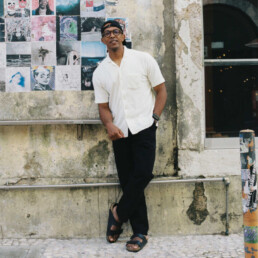The film industry can be a demanding place to work. Nobody knows this better than Karim Shaaban, a filmmaker who took stock of his life when he could not be present for the passing of a family member due to his commitment to being on a film set. Karim grapples with themes of responsibility, loss, and emotional detachment in our fast-paced world in his poignant new short film, I Don’t Care if the World Collapses Collapses.
“I hope it prompts viewers to reflect on how the pace of life can lead us to sacrifice what’s truly important and real and to recognize the need to stay aware and connected to ourselves along the way,” he wisely states. In our exclusive interview, Shaaban reflects on the creative journey of making his film, the challenges of indie filmmaking, and how this project has reshaped his life and career.
It’s nice to meet you, Karim! You’ve mentioned that you were inspired to create your new short film, I Don’t Care if the World Collapses, after harrowing experiences over your on-set dealing with similar circumstances of prioritizing health. Given its personal and intense nature, can you elaborate on your emotional journey while developing this short film?
Karim Shaaban: It’s a pleasure to talk with you, Ryan. The emotional journey behind creating I Don’t Care if the World Collapses was intense. Initially, I questioned whether pursuing this story was the right decision, especially at this career stage. At that time, I was already deep in prep for another project, which eventually got canceled in 2023. Once I decided to dive fully into this film, everything started to fall into place, almost like a dream.
From the first call, everyone I contacted was enthusiastic and eager to participate. There was this shared excitement and mutual respect, and everything seemed to move seamlessly. After completing the film and having screened it twice, I realize this project has become a turning point in my life and career.
I’ve gone on a reflective journey through making and sharing this film. It’s made me look closer at myself—what kind of stories I want to tell and what draws me to filmmaking. In many ways, this project felt like a mirror, opening me up to deeper connections and trust, both personally and creatively.
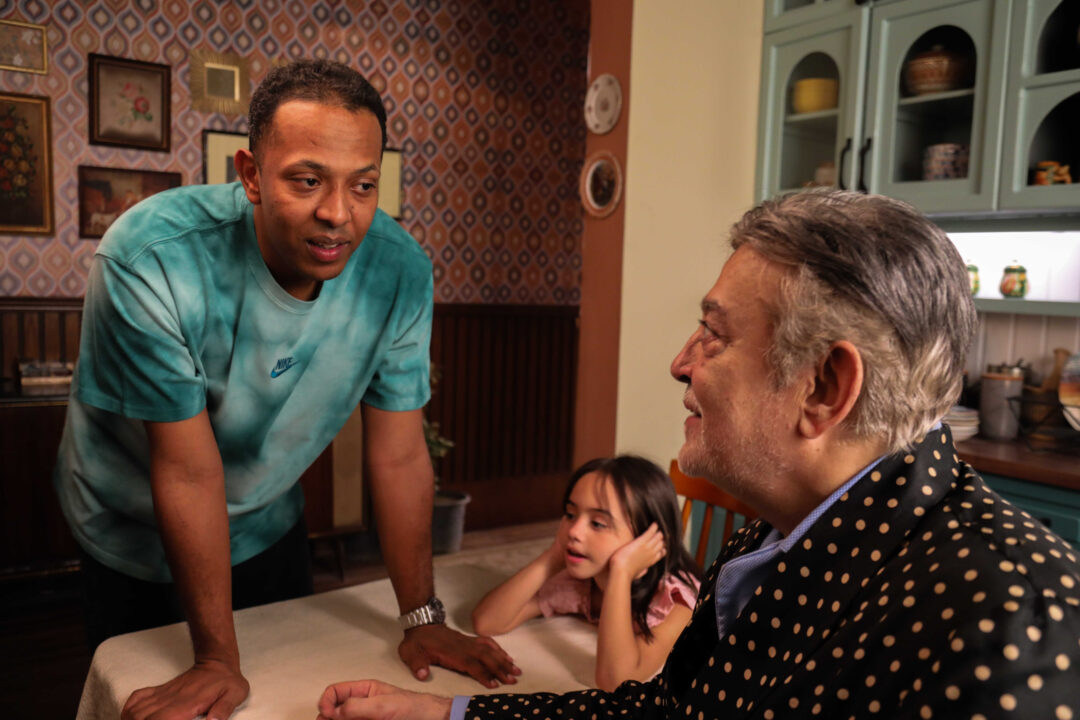
Can you discuss the main themes you wanted to explore in this film?
Karim Shaaban: The main themes I wanted to explore in this film are responsibility, loss, and the emotional detachment we all develop because of how our lives are structured. I wanted to examine the modern human being—someone willing to push their emotions aside and keep moving forward, creating products and achievements that ultimately feel meaningless. It’s about feeding into a machine that doesn’t care about the person behind it.
Instead of just observing this disconnect, the film places the audience directly in that experience—forcing them to confront the emotional void we create when we prioritize this endless cycle of productivity over genuine human connection. It’s not about showing what happens but rather making the viewer feel the weight of that choice.
Your statement critiques the capitalistic world and its detachment from personal realities. How did you integrate this critique into the film’s dialogue, characters, and plot?
Karim Shaaban: This critique is embedded in how the story is portrayed and how it shifts the narrative around these moments. Often, these situations are celebrated as signs of dedication, commitment, and professionalism—where people are proud of pushing their emotional and mental state aside to give work all the power and space it demands. But through this film, I wanted to challenge that perception.
As for the dialogue, characters, and plot, I think Wael Hamdy, who worked closely on those aspects, can speak more deeply about it. From my perspective, though, the characters themselves are reflections of this critique. Take Magdy, the production manager in the film, who says he’s holding onto his position with all his strength, unable to risk it for anyone or anything. This mirrors how so many people navigate our modern world—working tirelessly to stay in place, willing to sacrifice more and more to keep moving forward. But often, the small sacrifices we make, the ones we don’t even notice, can grow over time and ultimately reshape who we are. That’s the unsettling reality I wanted to capture.
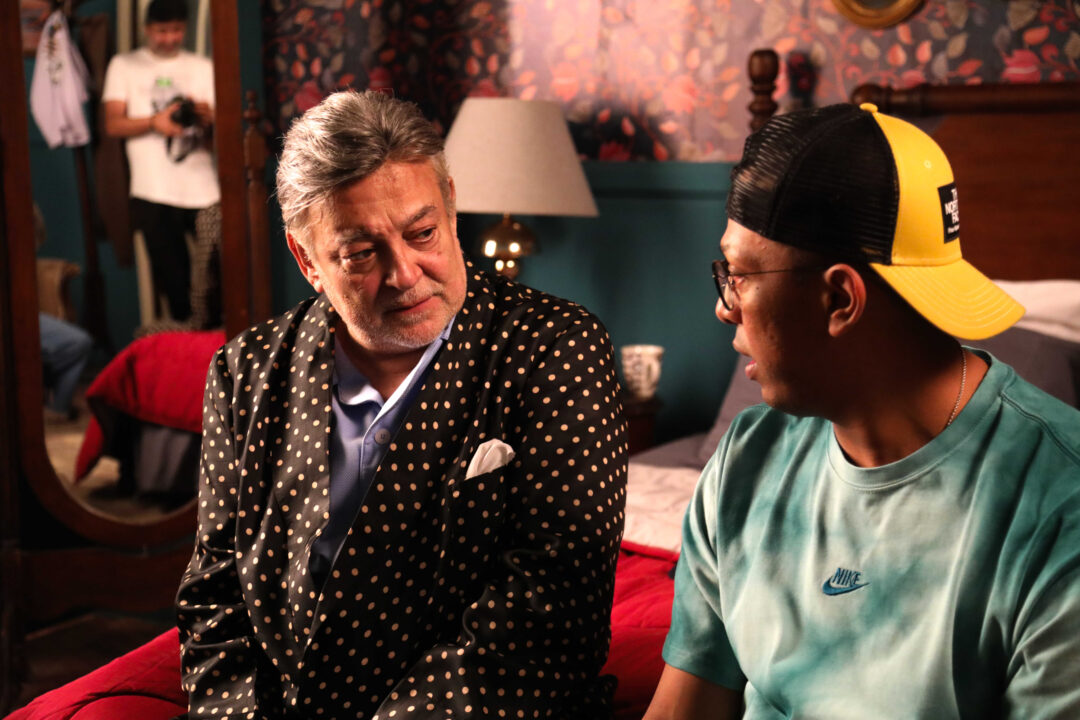
How did you approach directing the scene where Farouk receives the disturbing phone call? What was your vision for this pivotal moment?
Karim Shaaban: For that scene where Farouk receives the disturbing phone call, my vision was to create a sense of harmony first—a moment where everything feels calm and flowing. I wanted the director on set to be happy, guiding the young girl and the actor to enjoy the moment fully. Then, with the unexpected call, that harmony shatters. I wanted to capture that shift gradually, showing the whole set as the mood changes, focusing on the eye contact between the crew as they silently ask, What’s happening? What do we do now?
But honestly, watching Emad Rashad perform this scene on set was breathtaking. We were all in awe of his presence—this legend truly delivered. At first, I was stunned, and even though I felt I should adjust something and reshoot, I hesitated to ask him to do it again. It felt like a perfect moment, and part of me was embarrassed to disrupt that. After consulting with Beshoy Rosefelt, our DoP, he encouraged me to ask Emad and let him decide. To my relief, Emad agreed, and he performed it precisely as he had the first time—just as powerful. In the end, I couldn’t resist using the first take when it came to editing. It felt so natural in the moment, and I knew it captured the raw emotion we all felt on set.
What was your process for casting the roles of Loubna and Farouk? How did you find actors who could convey the urgency and emotional stakes of the story?
Karim Shaaban: For Loubna, I had been following Salma Abu Deif’s work for quite some time, admiring her growth as an actress. Her development was impressive, and I always knew I wanted to work with her someday. In 2023, she starred in the Ramadan series Al Imam, and there was a particular scene where she was alone, navigating a complex emotional moment. I paused at that scene because her performance was so raw and genuine—wholly unfiltered and natural. At that moment, I knew Salma was the perfect choice for Loubna. Even if it didn’t work out for this short, I wanted to collaborate with her on another project.
For Emad Rashad, who plays Farouk, he came highly recommended by Wael Hamdy. Emad is a legend in his own right, primarily known for his work in the 80s and 90s, and with his theatrical background, he’s truly a master of the craft. When we first met, he told me the story reminded him of his best friend, the legendary Farouk El Fishawy, who had passed away. That personal connection made his portrayal of Farouk even more powerful, adding an emotional depth that brought the role to life.
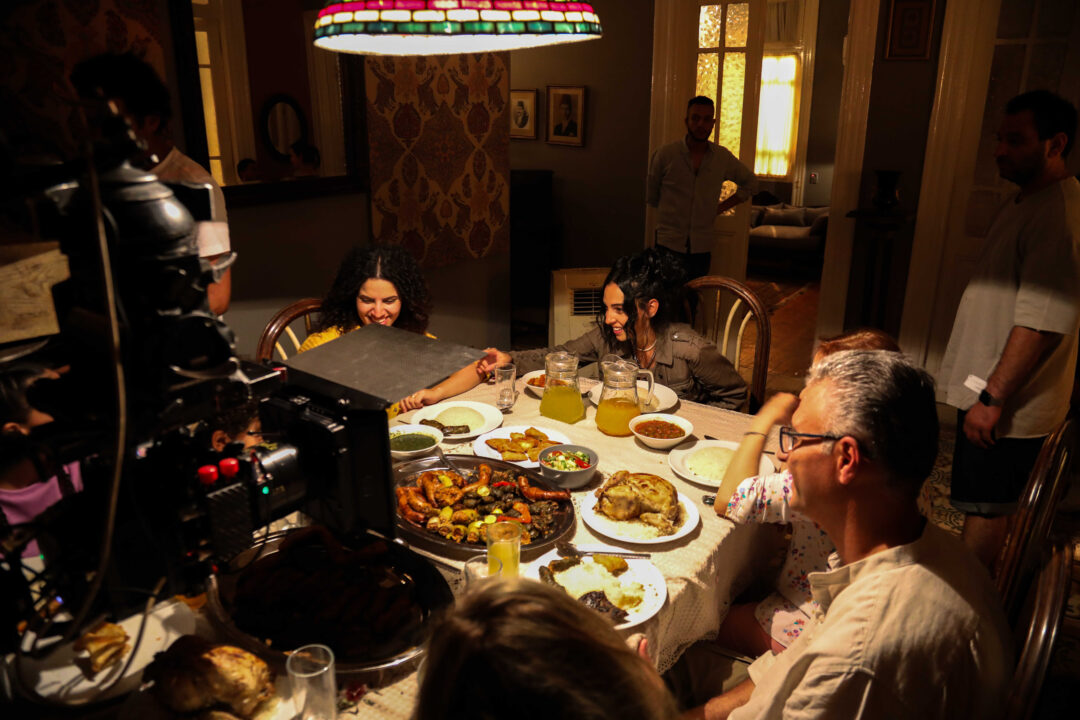
Were any scenes or elements of the film that were particularly challenging to shoot or edit? How did you overcome these challenges?
Karim Shaaban: The whole film challenged me because I only had the budget for three shooting days, which I funded entirely from my savings. There was no extra money for additional hours, so part of me was terrified that we might not finish everything in time. I vividly remember the first shooting day—we spent around seven hours on a single scene. It was a deceptively complex scene because, while it was technically one scene, the blocking and movement made it feel like we were shooting three different ones. That day, I seriously doubted whether we could complete everything as planned.
But somehow, we made it work. I had to trust the process, enjoy it, and let things flow naturally. Ultimately, everything came together even better than I could have hoped. It was about letting go of the pressure and allowing the film to take its shape.
How did the constraints of an indie budget influence the production decisions and overall approach to making this film?
Karim Shaaban: I didn’t approach this project with the typical indie film production mindset or market in mind. I had complete freedom in decision-making and never viewed the project with any hard limits or budget caps. I focused on bringing my vision and story to life and wanted to craft every detail with dedication and love.
Of course, I had a budget in mind, and we did our best to stick to it, but in the end, we exceeded what we planned. Whenever something unexpected required more resources, I was ready to invest further. I poured a year’s worth of commercial work into this project, which brought me happiness and freedom. My goal was always to serve the story, and by the end, I felt there was nothing more I could’ve done—it was all on the screen.
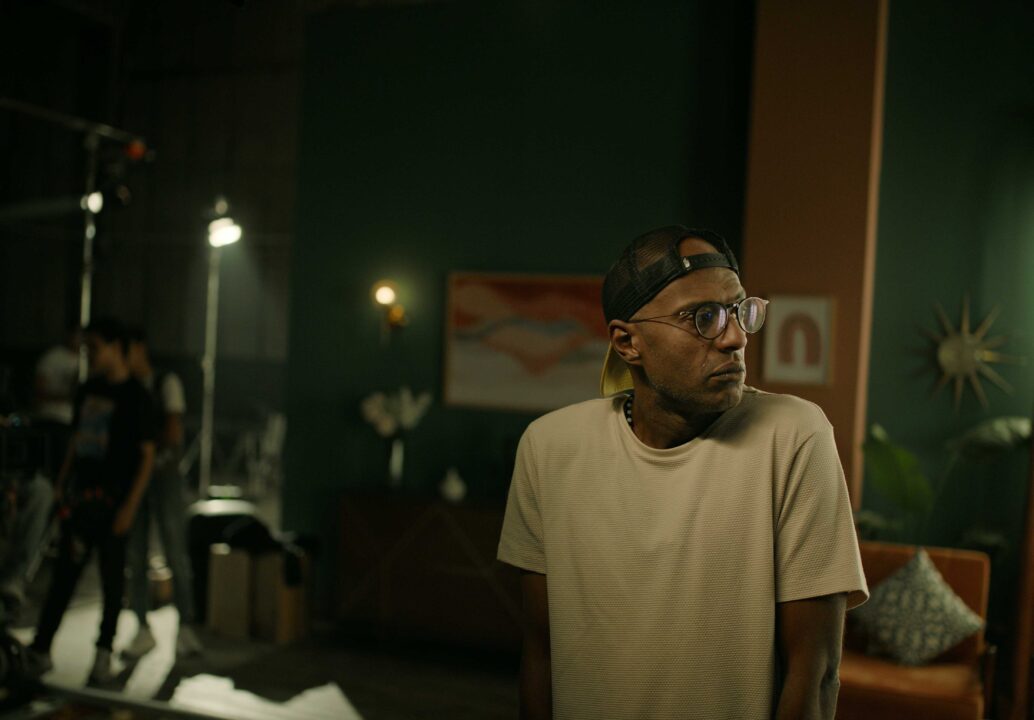
How does your experience with this short film reflect the broader challenges and opportunities in the indie film industry, and what advice would you give aspiring indie filmmakers?
Karim Shaaban: My experience with this short film led to profound realizations about myself and the industry. As filmmakers, we often push ourselves by this need to impress, to show the world how exceptional we are—constantly seeking new ideas, fresh visuals, and ways to stand out. While that pursuit is noble and worth chasing, the process becomes more personal. I’ve come to see that art is really about the self. It’s a medium for communication and connection. We’re meant to be present in what we create, allowing ourselves to be vulnerable and creating spaces for dialogue, growth, and reflection. It’s about learning more about ourselves and each other and building towards a more peaceful future.
For aspiring indie filmmakers, my advice is simple: be yourselves. Don’t be afraid to lean into stereotypes or preconceived notions; open your hearts and create with love and enjoyment. That’s where originality truly comes from. I’m curious about you, your story, and how you bring it to life because it comes from a place you can access. The idea and execution reflect who you are, so stay present and entirely exist within the process. That’s where the magic happens.
What do you hope audiences take away from this short film, especially regarding the characters’ experiences and the overall narrative?
Karim Shaaban: I see this short film as part of a more extensive dialogue—actually, I think all films are. They’re like condensed conversations crafted with intention and purpose, where we spend months or even years preparing our side of the discussion. Then, the audience’s side of the conversation begins when the film ends. That’s what I’m hoping for with this film.
I want it to lead to serious discussions about right and wrong and how to ensure our emotional and mental well-being throughout life. I hope it prompts viewers to reflect on how the pace of life can push us into sacrificing what’s fundamental and recognize the need to stay aware and connected to ourselves along the way.

